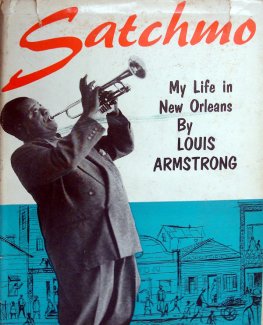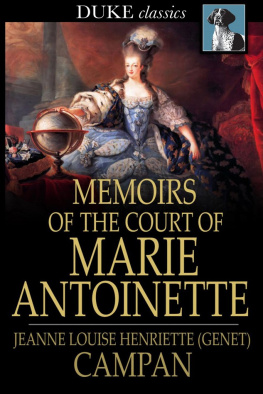PREFACE.
The Duchesse dOrleans, commonly though incorrectly styled the Princess of Bavaria, was known to have maintained a very extensive correspondence with her relations and friends in different parts of Europe. Nearly eight hundred of her letters, written to the Princess Wilhelmina Charlotte of Wales and the Duke Antoine-Ulric of Brunswick, were found amongst the papers left by the Duchess Elizabeth of Brunswick at her death, in 1767. These appeared to be so curious that the Court of Brunswick ordered De Praun, a Privy Councillor, to make extracts of such parts as were most interesting. A copy of his extracts was sent to France, where it remained a long time without being published. In 1788, however, an edition appeared, but so mutilated and disfigured, either through the prudence of the editor or the scissors of the censor, that the more piquant traits of the correspondence had entirely disappeared. The bold, original expressions of the German were modified and enfeebled by the timid translator, and all the names of individuals and families were suppressed, except when they carried with them no sort of responsibility. A great many passages of the original correspondence were omitted, while, to make up for the deficiencies, the editor inserted a quantity of pedantic and useless notes. In spite of all these faults and the existence of more faithful editions, this translation was reprinted in 1807. The existence of any other edition being unknown to its editor, it differed in nothing from the preceding, except that the dates of some of the letters were suppressed, a part of the notes cut out, and some passages added from the Memoirs of Saint-Simon, together with a life, or rather panegyric, of the Princess, which bore no slight resemblance to a village homily.
A copy of the extracts made by M. de Praun fell by some chance into the hands of Count de Veltheim, under whose direction they were published at Strasburg, in 1789, with no other alterations than the correction of the obsolete and vicious orthography of the Princess.
In 1789 a work was published at Dantzick, in Germany, entitled, Confessions of the Princess Elizabeth-Charlotte of Orleans, extracted from her letters addressed, between the years 1702 and 1722, to her former governess, Madame de Harling, and her husband. The editor asserts that this correspondence amounted to nearly four hundred letters. A great part of these are only repetitions of what she had before written to the Princess of Wales and the Duke of Brunswick. Since that period no new collections have appeared, although it is sufficiently well known that other manuscripts are in existence.
In 1820 M. Schutz published at Leipsig the Life and Character of Elizabeth-Charlotte, Duchesse dOrleans, with an Extract of the more remarkable parts of her Correspondence. This is made up of the two German editions of 1789 and 1791; but the editor adopted a new arrangement, and suppressed such of the dates and facts as he considered useless. His suppressions, however, were not very judicious; without dates one is at a loss to know to what epoch the facts related by the Princess ought to be referred, and the French proper names are as incorrect as in the edition of Strasburg.
Feeling much surprise that in France there should have been no more authentic edition of the correspondence of the Regent-mother than the miserable translation of 1788 and 1807, we have set about rendering a service to the history of French manners by a new and more faithful edition. The present is a translation of the Strasburg edition, arranged in a more appropriate order, with the addition of such other passages as were contained in the German collections. The dates have been inserted wherever they appeared necessary, and notes have been added wherever the text required explanation, or where we wished to compare the assertions of the Princess with other testimonies. The Princess, in the salons of the Palais Royal, wrote in a style not very unlike that which might be expected in the present day from the tenants of its garrets. A more complete biography than any which has hitherto been drawn up is likewise added to the present edition. In other respects we have faithfully followed the original Strasburg edition. The style of the Duchess will be sometimes found a little singular, and her chit-chat indiscreet and often audacious; but we cannot refuse our respect to the firmness and propriety with which she conducted herself in the midst of a hypocritical and corrupt Court. The reader, however, must form his own judgment on the correspondence of this extraordinary woman; our business is, not to excite a prejudice in favour of or against her, but merely to present him with a faithful copy of her letters.
Some doubts were expressed about the authenticity of the correspondence when the mutilated edition of 1788 appeared; but these have long since subsided, and its genuineness is no longer questioned.
SECTION I.
If my father had loved me as well as I loved him he would never have sent me into a country so dangerous as this, to which I came through pure obedience and against my own inclination. Here duplicity passes for wit, and frankness is looked upon as folly. I am neither cunning nor mysterious. I am often told I lead too monotonous a life, and am asked why I do not take a part in certain affairs. This is frankly the reason: I am old; I stand more in need of repose than of agitation, and I will begin nothing that I cannot, easily finish. I have never learned to govern; I am not conversant with politics, nor with state affairs, and I am now too far advanced in years to learn things so difficult. My son, I thank God, has sense enough, and can direct these things without me; besides, I should excite too much the jealousy of his wife[Marie-Francoise de Bourbon, the legitimate daughter of Louis XIV. and of Madame de Montespan, Duchesse dOrleans.]and his eldest daughter,[Marie-Louise-Elizabeth dOrleans, married on the 17th of July, 1710, to Charles of France, Duc de Berri.]whom he loves better than me; eternal quarrels would ensue, which would not at all suit my views. I have been tormented enough, but I have always forborne, and have endeavoured to set a proper example to my sons wife and his daughter; for this kingdom has long had the misfortune to be too much governed by women, young and old. It is high time that men should now assume the sway, and this is the reason which has determined me not to intermeddle. In England, perhaps, women may reign without inconvenience; in France, men alone should do so, in order that things may go on well. Why should I torment myself by day and by night? I seek only peace and repose; all that were mine are dead. For whom should I care? My time is past. I must try to live smoothly that I may die tranquilly; and in great public affairs it is difficult, indeed, to preserve ones conscience spotless.
I was born at Heidelberg (1652), in the seventh month. I am unquestionably very ugly; I have no features; my eyes are small, my nose is short and thick, my lips long and flat. These do not constitute much of a physiognomy. I have great hanging cheeks and a large face; my stature is short and stout; my body and my thighs, too, are short, and, upon the whole, I am truly a very ugly little object. If I had not a good heart, no one could endure me. To know whether my eyes give tokens of my possessing wit, they must be examined with a microscope, or it will be difficult to judge. Hands more ugly than mine are not perhaps to be found on the whole globe. The King has often told me so, and has made me laugh at it heartily; for, not being able to flatter even myself that I possessed any one thing which could be called pretty, I resolved to be the first to laugh at my own ugliness; this has succeeded as well as I could have wished, and I must confess that I have seldom been at a loss for something to laugh at. I am naturally somewhat melancholy; when anything happens to afflict me, my left side swells up as if it were filled with water. I am not good at lying in bed; as soon as I awake I must get up. I seldom breakfast, and then only on bread and butter. I take neither chocolate, nor coffee, nor tea, not being able to endure those foreign drugs. I am German in all my habits, and like nothing in eating or drinking which is not conformable to our old customs. I eat no soup but such as I can take with milk, wine, or beer. I cannot bear broth; whenever I eat anything of which it forms a part, I fall sick instantly, my body swells, and I am tormented with colics. When I take broth alone, I am compelled to vomit, even to blood, and nothing can restore the tone to my stomach but ham and sausages.






